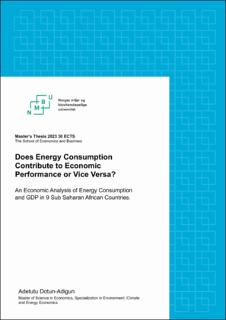| dc.description.abstract | This study examines the relationship between energy consumption and economic growth in Rwanda, South Africa, Namibia, Kenya, Tanzania, Ghana, Ethiopia, Nigeria and the Democratic Republic of Congo. The period for the study spans the years 1996 to 2020. The independent variables in the study include capital, labour, energy consumption, financial development, foreign direct investment, regulatory quality, and voice and accountability. The presence of cross-sectional dependence in the data warrants the use of second-generation unit root and co-integration tests, alongside the augmented mean group estimator for parameter estimation. The findings of the study suggest that the impact of energy consumption on economic growth was mixed. It increases economic growth in Tanzania, Nigeria, and Ethiopia, but reduces economic growth in Congo DR, South Africa, Kenya, Ghana, Rwanda, and Tanzania. The causality results suggest a bidirectional causality between labour and economic growth, in the selected countries. | |
